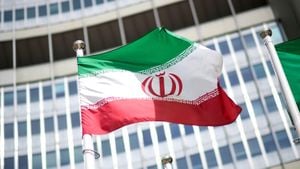President-elect Donald Trump has set the stage for his upcoming administration by making key cabinet appointments, selecting individuals who reflect his administration's priorities and controversial stances. Among the most notable choices is former Florida Attorney General Pam Bondi, nominated for the position of Attorney General following the withdrawal of former Representative Matt Gaetz from consideration. This appointment signals not just the reliance on trusted allies but also the continuation of contentious policies surrounding law and order.
Bondi's nomination is emblematic of Trump's approach, echoing his reliance on loyal allies. Having been Florida's first female attorney general from 2011 to 2019, Bondi has spent nearly two decades as a prosecutor before transitioning to statewide office. Her track record includes championing tough immigration laws and taking on significant roles during Trump's first impeachment trial, where she defended him against accusations of abuse of power.
While Bondi's past isn't without controversy, it is her close ties to Trump and staunch defense of his policies during historical legal scrutiny—particularly during the impeachment proceedings—that solidified her position as the right pick for the job. Interestingly, she had previously solicited a donation from Trump for her re-election campaign, which raised eyebrows due to her subsequent decision not to join lawsuits against Trump University, which was accused of fraud. Meaning, her actions have often intersected with ethical concerns about the nature of political campaigning and legal accountability.
But Bondi is just one piece of the puzzle. Another significant appointment is hedge fund manager Scott Bessent, picked as Secretary of the Treasury. Bessent's selection has turned heads, especially considering his previous association with controversial financier George Soros. Despite his long history as a Republican donor, Bessent's ties to Soros—a frequent target of conservative ire—could generate friction among certain GOP circles. Still, his economic credentials and advisory role during Trump's campaign may provide him the leverage needed to navigate such challenges.
Trump's economic strategy, as reflected through Bessent, indicates a focus on raising tariffs and cutting taxes. Bessent is known for advocating deregulation and rolling back government subsidies, policies expected to resonate with Trump's voter base. Despite this, Bessent faces the formidable task of managing the national debt, which hovers around $36 trillion, and proposing economic measures without inciting inflation—a hot topic within economic circles today.
Additional appointments highlight Trump's strategic approach to filling key roles. Other nominees include prominent figures like Marco Rubio as Secretary of State, Linda McMahon as Education Secretary, and Dr. Mehmet Oz as the Medicare and Medicaid administrator. Each candidate brings unique backgrounds and established connections, ensuring Trump’s administration reflects his original vision of governance.
Rubio's nomination possibly signals Trump's intent to re-align foreign policy strategies, drawing from Rubio’s experience and established presence in international relations. Meanwhile, McMahon's appointment is notable, reflecting Trump's focus on education reform and the support of private-sector approaches to managing public education. Oz's nomination aligns with the current administration's health care priorities, connecting Trump's discussions on health reform with influential voices from popular media.
While these appointments pit Trump’s loyalists against more traditional Republican figures, they also set the stage for the controversies likely to arise around their confirmations. Bondi’s history, for example, opens the door for discussions about her previous legal stances and the ethical ramifications of her political activities. Concerns have already emerged about how her past interactions with Trump’s businesses could influence her decisions at the Justice Department, particularly as his numerous legal engagements are set to continue through his presidency.
Similarly, Bessent's past ties could provoke debates around economic policy direction, especially with Democrats focusing on attacking previous affiliations with those they perceive as adversaries to the party's platform. Expect questions around his ability to effectively implement Trump's policies without aligning himself too closely with partisan figures like Soros. The balance between aggressive economic strategies and managing relations on Capitol Hill also remains delicate.
Meanwhile, the sentiment surrounding these appointments reflects broader divisive lines within the Republican Party itself. There is growing concern from traditional conservatives about how closely these newcomers align with core values and party principles. The election of Trump has radically transformed the party’s direction, and these cabinet picks amplify the shift toward populism and loyalty over traditional qualifications or bipartisan collaboration.
Looking at how these selections fit together, it’s clear Trump aims to create not just allies among his cabinet but also figures willing to confront the status quo of American political and economic systems. This could either unify his base or widen the rift within the party as moderate Republicans grapple with the ideological shifts taking place. Trump's presidency will likely face scrutiny and resistance not only from opposition parties but also from within his ranks.
One thing is for sure; as the confirmation processes begin, scrutiny will be at an all-time high. Senators on both sides of the aisle will comb through past actions, comments, and connections of these nominees, especially as there are serious questions surrounding how they plan to operate within the legally fraught environment surrounding Trump. The stakes couldn’t be higher as every appointment opens another front for debate around the direction of U.S. policies and governance.
Overall, the selections made by Trump reflect not just his priorities but also the challenges of his administration. With significant roles still unfilled, including key positions at the Labor Department and heads of health organizations, the next few weeks will be telling about how Trump intends to lead his government amid bipartisan contention. The coming weeks will likely reveal how these appointments all interlace and how they set the tone for Trump's administration during this pivotal time.



